Live at Home: How BBC Radio 2 pulled off a festival during a pandemic
- Published
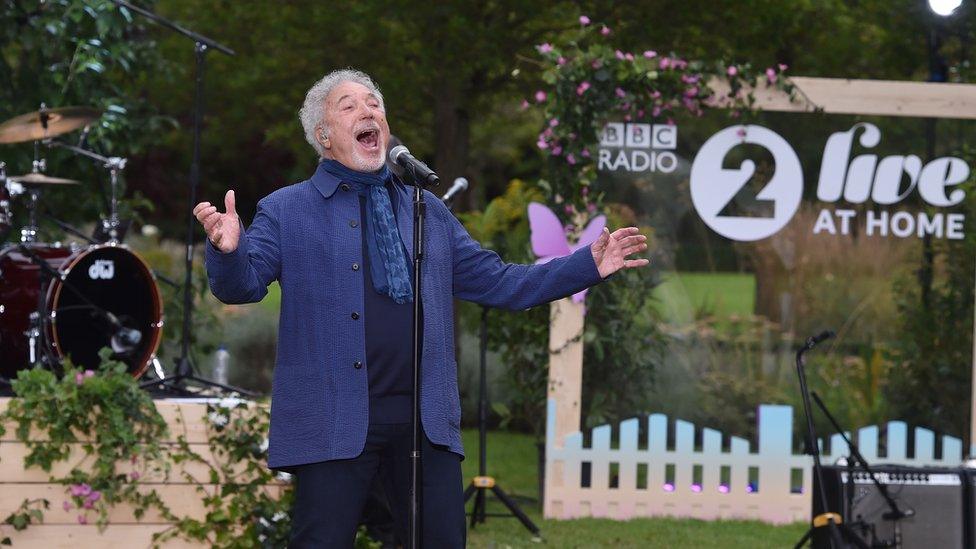
Sir Tom Jones belted out the hits in a near-empty garden
Two weeks ago, in a walled garden in Hertfordshire, Sir Tom Jones played a greatest hits set to an audience of crickets, butterflies and Trevor Nelson.
"I felt like I'd regressed 20 years and gone to my first concert," enthuses the DJ.
"He was incredible. Just celebrated his 80th birthday and his voice was still great, so I felt really, really privileged."
Under normal circumstances, Nelson wouldn't be treated to a private audience with a singing knight of the realm. But these are abnormal times - and there was a plan afoot.
This Sunday should have been the 10th instalment of BBC Radio 2 Live In Hyde Park - a "festival in a day" that sees the nation's biggest radio station throw a huge party for 50,000 fans in central London.
This year's line-up was signed and sealed at the start of 2020, but it soon became apparent that coronavirus was going to play havoc with the live music industry.
'Hugely different'
"A lot of us realised in March that things were going to be hugely different," says Radio 2's head of music Jeff Smith. "And I thought to myself, 'We need to make some plans'."
Almost immediately, he says, he "had a vision that we would try to replicate the feel of a park or an outdoor event in the context of a virtual concert".
The search began for an alternative venue - one sufficiently secluded to stop crowds gathering, but big enough to accommodate the articulated trucks the BBC would need to build a set and film the show.
Once the location was identified (an undisclosed but impressive manor house outside London), Smith went back to the artists. Some had to pull out, but the core line-up remained intact. And so, this weekend, audiences will get to see and hear Sir Tom playing in the open air alongside The Killers, Craig David, Chic, Sheryl Crow, The Pretenders, Erasure and McFly for Radio 2 Live At Home.
"Let's be honest, we've actually provided them with a decent backdrop," says Nelson, who will host the TV coverage with Jo Whiley. "I've seen enough bookshelves to last a lifetime."
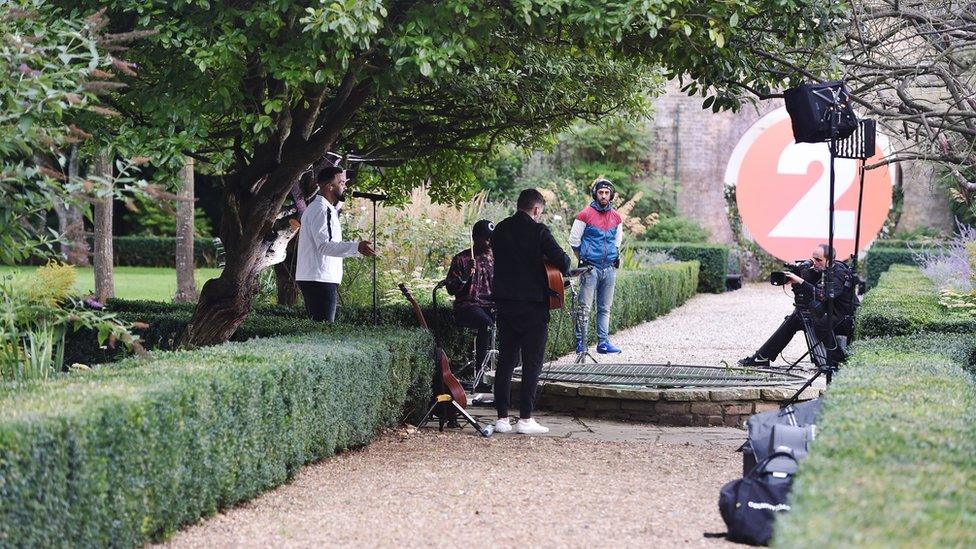
Music was filmed by a skeleton crew, all adhering to social distancing guidelines
Pulling the concert together was no easy task. The crew had to be kept to a bare minimum, and every performer had to have Covid-19 tests and temperature checks on site.
"The risk assessment was about 35 pages long," says Rhys Hughes, head of content for the BBC's Live Music team.
But even after months of planning, Hughes was ambushed by the one thing he couldn't account for - the British weather.
"We caught the back of Storm Ellen as we were building the set," he says. "The crew had 50 or 60mph winds, torrential rain and lightning, and a couple of trees went down."
Chrissie Hynde of The Pretenders had to perform her soundcheck in the middle of a downpour - but when it came to filming the actual performances, "the weather gods smiled on us and we just about got away with it".
For many of the performers, the concert was the first chance they'd had to perform live in months - albeit without an audience.
"It was a bit surreal, if I'm honest," says Rebecca Ferguson, who recorded her half of a duet with US-based Nile Rodgers on the day.
"It felt a bit like I was partying alone in a field - but I had my mum dance about and had fun on my own.
"Just to get out there and sing again... I felt so grateful to be able to do what I love."
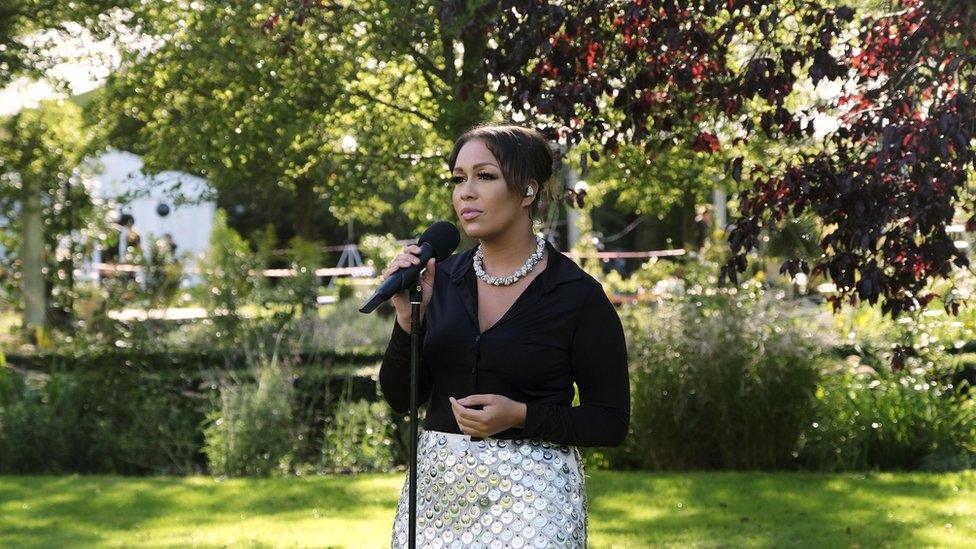
Rebecca Ferguson did her own hair and make-up to keep the crew to a minimum
For Nelson, watching the performances felt "strangely intimate".
"It's very naked for the artists because there was no feedback from the audience. So they had to be seasoned performers who could still turn it on."
Some, like Erasure's Andy Bell, were inspired by the scenery. "It really was an immersive wildlife experience," he says, "with actual butterflies and bees darting around the flowers - so you may see a few little creatures photobombing the set!"
Others, like McFly, were transported back to their early days as a band. "The first gig I ever did was for my nan's birthday in the garden like this," observes bassist Dougie Poynter.
"Yeah, I've done a few of these," replies his bandmate Danny Jones. "You know, when your mum goes, 'Why don't you play at the barbecue tonight with your band'?"
Sheryl Crow's 'portable audience'
However, the lack of an audience posed a challenge for Hughes. How to capture the show on film without it feeling sterile?
"I've seen a bit of footage of socially-distanced country shows in venues in America and it just looks awful," he confesses. "They're in a 4,000-capacity venue with 300 people inside and it can't be a great experience.
"So it's difficult to get that atmosphere, and we had to concentrate on the music and how we film and record that, to shoot it tight and make the visual backdrop look interesting for the audience."
Sheryl Crow, filming at her home in Nashville, had a more creative solution to the problem.
"As there was no actual audience I thought I'd bring my own on a little electronic speaker which let me play in some clapping sounds," she says.
"It wasn't quite a stadium roar, but a bit of fun for the performance."
The American acts all brought an extra touch of glamour - with The Killers playing a set on top of Caesar's Palace in Las Vegas and Gregory Porter performing to panoramic views of Los Angeles from the roof of the Capitol Records building (accompanied, virtually, by the BBC Concert Orchestra).
The footage looks spectacular, providing a breath of fresh air after months of lo-fi live streams. "Live from Lady Gaga's kitchen - we've all probably had enough of that," laughs Hughes.
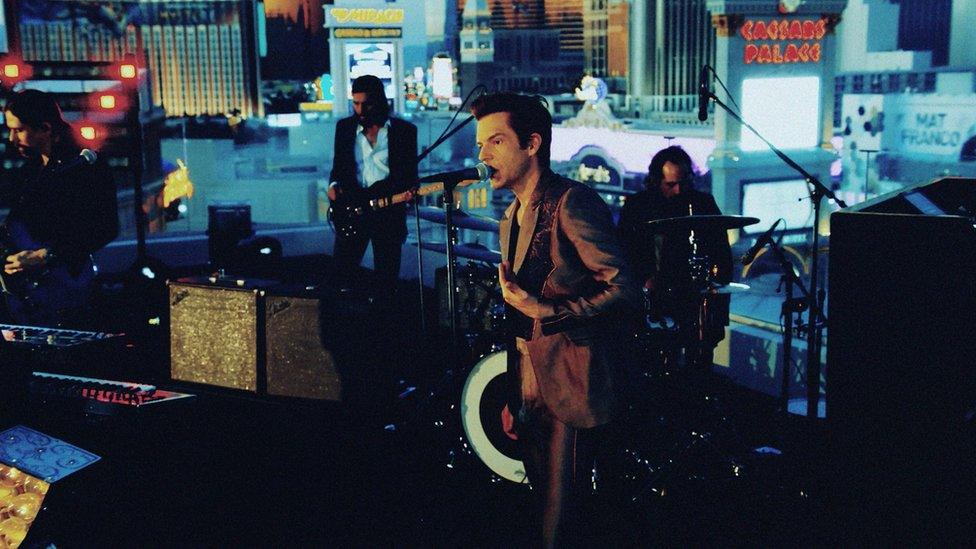
The Killers put on a special show in Las Vegas
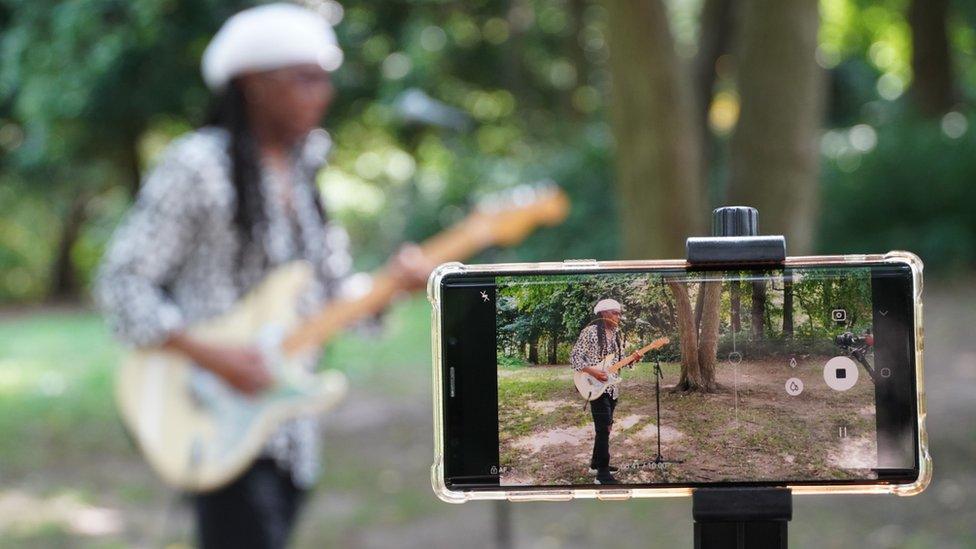
Chic's Nile Rodgers recorded his set on a phone in Central Park
But the Live At Home concert also highlights a more serious problem - the future of the live music industry.
With concerts cancelled all summer long, and for the foreseeable future, up to 60% of jobs in the sector could be lost.
For many of the crew working on Radio 2's show, from the caterers to the stage hands, it was the first job they'd had all year.
"Some of them said they'd had job offers in Dubai," says Nelson. "Another guy hadn't done anything. The caterers were saying normally they'd be doing festivals. So it hit home to me how strangling Covid is for live performances.
"It's really cut the guts out of the live music industry."
No-one really wants to repeat this socially-distanced version of the festival next summer - and the government has just announced plans to trial mass testing for audiences for indoor and outdoor venues - but the possibility is always there.
"Who really knows?" says Smith. "In my head, I'm planning for next year. I've got headliners. But we just don't know where those people will be at that particular time."
Hughes says everyone in the live music sector is "watching the money to see what happens with football".
"If we're in a position where football stadiums are full again by the end of the season next May, then hopefully things will be good. If we get a second spike, I think all bets are off for 2021."
But for now, Smith is optimistic that audiences will enjoy the alternative festival - even if they're missing out on the "trestle tables and the hampers in the park".
"I'm not sure this is better than Hyde Park would be," he says. "But in many ways I think we've replicated what that should feel like.
"So instead of feeling like an excuse and an apology, we've made a virtue of it."
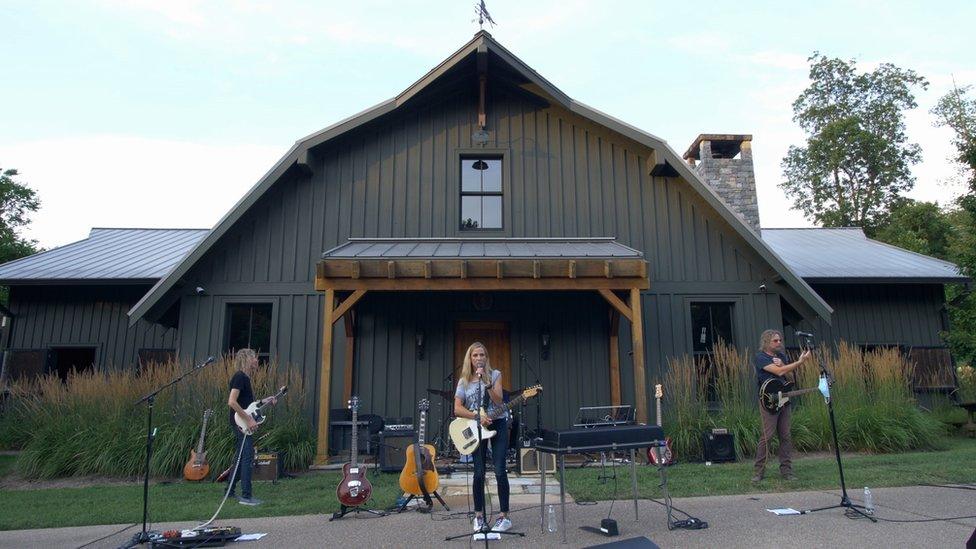
Sheryl Crow set up a stage outside the barn at her home in the US
Radio 2's Live at Home festival will be broadcast this weekend on BBC Radio 2, BBC Sound and BBC iPlayer, with TV highlights on BBC Two.

Follow us on Facebook, external, or on Twitter @BBCNewsEnts, external. If you have a story suggestion email entertainment.news@bbc.co.uk, external.